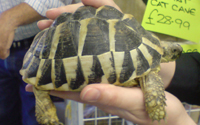SAVING WILDLIFE FROM THE PET TRADE
SAVING WILDLIFE FROM THE PET TRADE.
By ELAINE TOLAND.
It is not difficult to understand the fascination that many, if not most, people have for wildlife. Exotic, meaning non-native, animals can be especially intriguing to some because of the very fact that they are not commonplace on our ‘home turf’. An arguably similar fascination for exotic places can entice us to visit distant lands where we can enjoy and respect the differences and then return home to familiar ground, perhaps bearing one or two souvenirs to remind us of where we were and what we saw.
For most of us, seeing nature ‘where it is’ is enough. And given that mountains, rivers, whales and warm weather won’t get through Customs and Border Control anyway, the natural world will stay right where we left it. Unfortunately, many wild animals do fit through (and sometimes around) Customs, and this one-way trip into the commercial pet trade involves a tragic sequence of wild capture, handling and shipping from one dealer’s yard to another. Each surviving batch of animals leaves behind a saga of morbidity and mortality.
Recent years have seen an unprecedented raft of scientific reports demonstrating that the exotic pet trade is extensively interwoven with animal suffering, human disease, species and environmental degradation, and economic loss.
The latest evidence reveals that 75% or more of exotic pets like reptiles die in their first year in the home – and that does not include those masses that perish further up the commercial supply chain. Captive-breeding can account for 10-50% of some species, but production facilities are typically intensive and stressful, with their own poor welfare and high death rates.
There are over 70 exotic pet-linked diseases (called zoonoses), and these are on the rise. But because they often resemble flu and gastrointestinal illness, many cases go unrecognised. For example, actual prevalence of reptile-related salmonellosis in the UK may involve around 5,600 people – 200 times greater than officially recorded. Homes with a pet reptile are 17 times more likely to experience sickness than those without them. Numerous scientists and medics have labeled exotic pets as a ‘Trojan horse’ of infection in the home.
Collection of wild animals from nature for pets has been described as ‘out of control’ by field conservationists, and 25% of trade is thought to be illegal. Formal monitoring and enforcement is notoriously poor, and animal exploiters are given an almost free-ride to the bank as one of the few industries that do not have to prove their practices are safe before undertaking them.
Unwanted and released exotics are quickly becoming a focus for European and other nations due to the altering effects they can have on indigenous species and ecologies. A single pregnant guppy may be enough to establish as an invasive species and frogs can cause disease leading to extermination of entire amphibian populations. Of over 170 endangered species in Europe, 65 are at further risk from introduced species. About 50 invasive amphibian and reptile species are already established on the mainland, and there are around 11,000 ‘potentials’ out there – many are exotic pet species. The current annual ‘clean-up’ bill in the EU is 12.5 billion Euros.
The problems associated with exotic pet trading and keeping are diverse and substantial. The Animal Protection Agency’s strategy for resolving the harm inherent to the exotic pet trade comprises three simple steps: 1 – a ban on imports of wild-caught animals; 2 – improve the ‘lot’ for existing captives; 3 – ban all trade in exotic animals as pets.
The trafficking, smuggling and wrongful imprisonment of humans is rejected and condemned in any decent society. Yet the exotic pet trade represents all these abuses and more – all for the curiosity and diversion of ‘owning a piece of wildlife’. However, unlike human visitors to the natural habitats of wild animals, for exotic pets that have either been captured or bred, then boxed, transported, stockpiled, sold and caged, there will be no going home. Typically, they will die prematurely in an alien world with only a distant or genetic memory of the life they should have had.
Saving wildlife has become part of our modern lives. Saving wildlife from the pet trade needs to be part of our future.
About the author
For more information, please visit www.apa.org.uk

